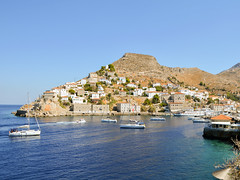Hydra Travel Guide

Hydra (Greek: Ύδρα) is a cosmopolitan island in the Aegean Sea between the Saronic Gulf and the Argolic Gulf. It is part of the so-called Argo-Saronic Islands, together with Aegina, Salamina, Spetses, Poros, Agkistri, Dokos and some smaller islands and islets. It has a population of 1,948 inhabitants as of 2011.
Hydra (from the ancient Greek Υδρέα < ύδωρ, meaning water) took its name from the fresh water springs that were found in abundance on the island, during the ancient times. The island of Hydra played an important role during the Greek War of Independence (1821-1829).
Today, the main town and port of Hydra are built amphitheatrically in the north part of the island, while ramparts are still found at either extremes of the town, remnants of the island's glorious past.
The island of Hydra is very picturesque and traditional, featuring listed heritage buildings dating back to the 18th century, and narrow cobbled streets, where transport is made possible only on foot or by donkeys. There are also traditional boats, as well as modern speed boats (water taxis), that move people between the beaches of the island, some of them being accessible only via the sea.
Owing to its beauty and traditional character, which has remained unspoilt through the years, Hydra has become not only a very popular summer and weekend destination, but also a favourite place for weddings, baptisms and other ceremonies and celebrations.
Places to visit
- the beautiful beaches of the island, accessible both via road and sea (Avlaki, Hydroneta, Kamini, Kaoumithi, Klimaki, Limnioniza, Mandraki, Nisiza, Palamida, Spilia, Vlychos) or exclusively via the sea (Agios Georgios, Agios Nikolaos, Bisti, Molos). Mandraki is the only sand beach on the island, with the rest of the beaches being either pebbled or rocky with clear waters
- the small island of Dokos, near Hydra, and its lighthouse
Monuments and Museums to visit
- the Museum of Historical Archives
- the Merchant Marine Academy
- the traditional pharmacy founded by Evangelos Rafalias, in 1980. Both the exterior and interior of the pharmacy have kept their original shape, including the furnishings, which have been maintained to a pristine condition and are still in use until today
- the Ecclesiastical Byzantine Museum
- the lighthouse of Zourva, in the east of the island, originally built in 1883 and restored in 1946 after its destruction during the World War II
- the historical houses of Pavlos and Lazaros Kountouriotis
Events to attend
- Easter in Hydra is celebrated in a traditional as well as spectacular manner, and it is one of the best occasions to visit the island
- the Miaoulia Festival taking place in late June and lasting for two weeks, featuring events and celebrations in honour of Andreas Miaoulis, a local admiral and politician that commanded Greek naval forces during the Greek War of Independence
- the sailing races taking place each year on the 25th of March and on the 28th of October
Food to taste
- amygdalota, traditional sweets of Hydra made with ground almond and egg whites and a distinct bitter-almond flavour
- fresh fish and seafood, such as octopus, calamari, lobster, prawns, mussels
Map of Hydra with accommodations
The blue markers shows the location of various accommodations in Hydra. The letter in the marker describes the accommodation types: H for Hotel, A for Apartment, R for Resort, B for Bed & Breakfast and O for Other (e.g. pension, villa). Click on the blue marker for more information on the accommodation.










